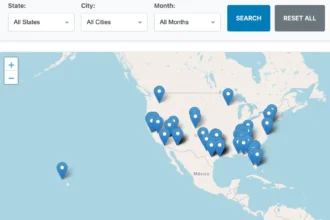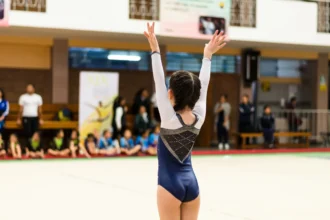What Are Gymnastics Meets? Complete Guide to Competition Types & Qualification
A gymnastics meet is a formal competition where gymnasts perform their routines on each apparatus in front of certified judges. These judges evaluate routines for difficulty, execution, and artistry, then give scores that determine rankings and awards. Meets can range from small in-gym practice events to international competitions like the Olympics.
Common Meet Types
• Intrasquad / Mock Meets: Practice competitions within one gym.
• Invitationals: Local to large-scale meets hosted by gyms; most common during the season.
• State Championships: Official competition for the best athletes in each state.
• Regional Championships: Top gymnasts from several states compete together.
• Nationals: The highest domestic level for Development Program and Xcel gymnasts.
• Elite Competitions: Meets like the U.S. Classic, Championships, and Olympic Trials.
• Collegiate Meets: NCAA and NAIGC competitions for college gymnasts.
• Showcase/Fun Meets: Less formal, designed for recreational athletes.
Types of Gymnastics Meets
| Meet Type | Who It’s For | Purpose | How You Qualify / Enter | Typical Season Timing |
|---|---|---|---|---|
| Intrasquad / Mock Meet | New or returning athletes in one gym | Practice meet to simulate competition | No qualification; gym decides participation | Pre-season or early season |
| Dual / Tri / Quad Meet | Two to four teams | Head-to-head competition, smaller scale | No qualification; clubs arrange to compete | Throughout season |
| Invitational | All DP and Xcel levels | Gain experience, earn scores, team bonding | Register through gym; no qualification beyond membership/age rules | Fall–spring |
| Sectional / District / Qualifier | Levels that need a “score to State” | Earn required score to move on to State | Must achieve the minimum all-around score set by the state/region | Mid-season |
| State Championships | DP & Xcel gymnasts by level/division | Crown state champions; advance some to Regionals | Meet state qualifying score, age, and meet participation rules | Late season (spring) |
| Regional Championships | Top gymnasts from each state region | Higher-level, multi-state competition | Qualify at State by placement or score (varies by level/region) | Late season |
| National-Level Events | Upper optionals & elite | National titles; exposure to recruiters | Qualify at Regionals or designated qualifiers | End of season |
| Showcase / Fun Meet | Recreational & pre-team athletes | Performance only, medals for participation | No qualification; sign-up based | Flexible |
| Collegiate (NCAA / NAIGC) | College varsity or club gymnasts | Team competition and championships | Conference or qualifying standards | Jan–Apr (NCAA season) |
| Elite Pathway (Hopes / Classics / Championships) | Elite-track athletes | National team selection, international pathway | Must pass elite qualification system and required cut-scores | Spring–summer |
How to Qualify for Gymnastics Meets
Local meets like in-gym events or invitationals don’t need qualifying scores, gymnasts just sign up through their gym. Bigger meets, such as State, Regionals, and Nationals, require athletes to earn a minimum score at earlier competitions to move forward. Elite gymnasts qualify by hitting set scores at national qualifiers, while college teams advance through conference and regional results.
Step 1 Intrasquad / Mock Meets
Purpose: Low-pressure, in-gym “practice meets” that simulate march-in, warm-ups, rotations, routines, and awards.
Who Competes: Pre-team, compulsory (DP 1-5), and returning athletes testing new routines.
Requirements:
- No mobility or qualifying score needed
- Usually unsanctioned; if sanctioned, athletes must be USAG-registered
Progression: Does not lead to championships; purely for experience and confidence.
Step 2 Invitational Meets
Purpose: Core regular-season meets for experience, feedback, and official scores (when sanctioned).
Who Competes: All Development Program (DP) levels 1-10 and all Xcel divisions.
Requirements:
- No pre-qualification to enter (your gym registers you)
- Scores from sanctioned meets can be used for level mobility
USAG Mobility Scores (to move up a level):
- Level 4 → 5: 34.00 AA
- Level 5 → 6/7: 32.00 AA
- Level 6 → 7: 32.00 AA
- Level 7 → 8: 32.00 AA
- Level 8 → 9: 34.00 AA
- Level 9 → 10: 34.00 AA
Skip Option: A Level 4 gymnast may skip Level 5 and go directly to Level 6 with two separate 36.00 AA scores at Level 4 sanctioned meets.
Progression: Invitationals don’t lead directly to championships, but they’re where many gymnasts achieve their qualifying score for State and mobility scores for level advancement.
Step 3 Sectionals / District Qualifiers (if used in your state)
Purpose: A “score-to-State” checkpoint in states that use this step.
Who Competes: Athletes in states/regions that require a qualifying score before State.
Requirements:
- Achieve the minimum all-around score set by your state/committee
- Meet level age eligibility
- Note: This step is not universal—some states skip it
Progression: Hitting the qualifying score unlocks entry to State Championships.
Step 4 State Championships
Purpose: Crowns state champions and, at many optional/Xcel levels, determines advancement to Regionals.
Who Competes: DP levels 2-10 and all Xcel divisions (Bronze-Sapphire) that met the state’s entry standard.
Requirements (typical, set locally):
- State qualifying score (varies by level and by state)
- Participation in at least one sanctioned meet prior to State
- Meet USAG age eligibility for the level
Progression:
- Compulsory (DP 1-5): Often end at State (some regions may offer more)
- Optional (DP 6-10) & upper Xcel: High placers/scores at State advance to Regionals (rules set by region)
Step 5 Regional Championships
Purpose: Multi-state championship; one step above State (eight regions nationally in Women’s Artistic).
Who Competes: State qualifiers per regional criteria.
Requirements (set by region/level; examples below):
- Level 9/10: Many regions require a 34.00 AA at State to qualify to Regionals (example: Region 6 2025/2026 criteria)
- Levels 6-8: Often percentage-based advancement from State (varies by region)
- Xcel Platinum/Diamond/Sapphire: Region-specific score/placement rules
- Petitions: Allowed in some cases (injury/illness) per Rules & Policies
Progression:
- Levels 6-8: Often end at Regionals
- Levels 9-10 and Xcel upper divisions: May advance to Nationals based on regional quotas/placements set each season
Step 6 Nationals
Purpose: Highest domestic stage for these pathways; crowns national champions and provides recruiting visibility.
Who Competes:
- DP Nationals: Levels 9-10 who qualify at Regionals
- Xcel (beginning in 2027): National Xcelebration for Platinum, Diamond, Sapphire athletes who qualify from Regionals
- Elite: Separate pathway (Classics → U.S. Championships → Trials)
Requirements:
- Regional placement/quota set annually by USAG/regions
- Athletes must meet USAG age eligibility for their level
Typical Quotas (vary annually):
- Exact quotas are published in regional packets each year
- Example: Region packets specify exact AA scores and placement requirements
Progression:
- For most DP/Xcel athletes, Nationals is the season finale
- Elite athletes continue to international selection events
Gymnastics Meets FAQ (Progression Made Simple)
Q1: Do all levels reach Nationals?
No. Most gymnasts stop earlier. Levels 1–5 usually end at State. Levels 6–8 often stop at Regionals. Only Levels 9–10 and upper Xcel divisions can reach Nationals.
Q2: What’s the difference between an Invitational and a State Meet?
Invitationals are open to anyone — gyms just register. They’re for practice, scores, and fun. State Meets are official championships. To get in, gymnasts must earn a qualifying score at another meet during the season.
Q3: How do gymnasts qualify for State?
To compete at State, a gymnast must achieve the minimum all-around score set by their state at a sanctioned meet during the season. Some states also require gymnasts to compete in at least one or two sanctioned meets before State.
Q4: How do gymnasts qualify for Regionals?
By doing well at State. Some regions use a set score (like 34–35 AA), others take the top finishers in each age group. Levels 6–8 may end at Regionals, but 9–10 can advance further.
Q5: What are Sectionals or District Qualifiers?
These are “score-to-State” meets. Not every state has them, but when they do, gymnasts must hit a minimum score here to move on to State.
Q6: What’s the usual path in the Development Program (DP)?
It goes: Invitationals → State → Regionals → Nationals (for the higher levels). Lower levels end earlier, higher levels go further.
Q7: How is the Elite Pathway different?
Elite gymnasts don’t follow the regular DP path. They must qualify at special meets with higher cut-scores, then compete at Classics, Championships, Trials, and possibly the Olympics.
Q8: Do Xcel gymnasts progress the same way?
Not exactly. Bronze–Gold usually end at State. Platinum, Diamond, and Sapphire can reach Regionals, and starting in 2027, they’ll also have Nationals.
Q9: How do college meets work?
College gymnastics has its own system. Teams compete during the season, then advance to conference, regional, and national championships based on rankings — not DP or Xcel levels.
Q10: Why do some gymnasts stop at State while others go further?
It depends on the level. Lower levels are designed to finish locally, while higher levels have pathways to Regionals and Nationals.





